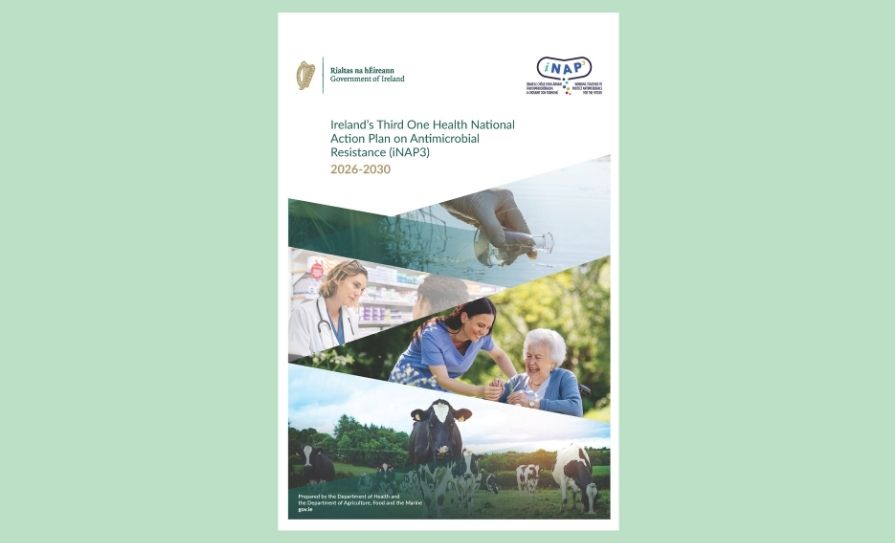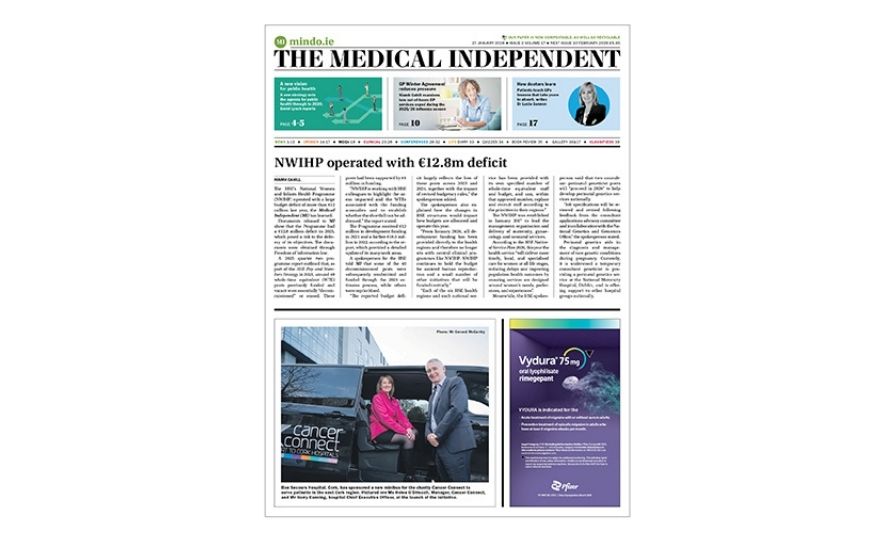An increasing number of doctors are accessing the Practitioner Health service. David Lynch reports
The Practitioner Health (PH) service experienced “another busy year” in 2024, according to its Medical Director Dr Íde Delargy.
The initiative, formerly named the Practitioner Health Matters Programme, was established in 2015. It provides a confidential service to doctors, dentists, and pharmacists experiencing stress, burnout, mental health, or substance use issues.
In the case of burnout, academic research has shown that this issue remains significant within Irish healthcare (see panels).
The PH service deals with a wide spectrum of presentations – from relatively minor concerns that can be quickly addressed to complex and severe mental health conditions. It now has two consultant psychiatrists on its team.
According to the service’s 2024 annual report, launched in Dublin in June, there were 113 new presentations last year, compared to 107 in 2023. In addition, 17 practitioners re-engaged with the programme in 2024.
Some 101 of the new presentations were by doctors. Replicating previous trends, there were more females than males. According to PH, it is noteworthy that practitioners attending the programme have “very good” outcomes.
The vast majority of the new practitioners seen last year are currently working and 56 have been discharged from the programme “fit and well”.
Over the past decade, the number of practitioners using the service has grown significantly. The 107 new presentations in 2023 represented a 48 per cent increase compared to 2018. Does this increase reflect an expanding need or heightened awareness of the service?
“I think there is definitely a growing need,” Dr Delargy told the Medical
Independent at the report’s launch. “That is, in terms of the stresses in the workplace, the demands [of the job], and probably the more litigious environment as well.”
Even in the absence of a complaint, “we’ve seen within our cohort of practitioners who present that there is a huge fear of making a mistake and being reported.”
There is rarely one singular issue that causes someone to seek help, noted the report. Several factors usually converge to cause distress. These can range from an adverse event at work, conflict in the workplace, a patient complaint, or a
personal issue.
Senior doctors
While senior doctors still represent a minority of the practitioners who access the service, the number is increasing each year. In 2024, an additional 17 consultants and general practitioners presented to the service compared to 2023.
Particular attention needs to be paid to this cohort, according to Dr Delargy. She said issues such as “conflict in the workplace” often arise as a source of difficulty.
“I think it is much more difficult for a senior clinician to seek help and find the appropriate help,” she said. “Obviously, they would need a very confidential service and it can be really difficult for them to find an independent, confidential service that’s completely separate from their workplace… and that’s really key. And that’s why I think those who have availed of the service find it so beneficial.”
Dr Delargy highlighted a testimonial from an unnamed consultant included in the report. She said it conveys the value of being heard and receiving a tailored management plan. “Some of the senior people we have seen never have discussed or disclosed some of [these] issues of concern in all their career.”
Doctors in the earlier stages of practice continue to comprise the majority of those who engage with PH. In 2024, 81 doctors who newly presented were in the younger age category (26-49 years). Some supports utilised by this younger cohort include those provided by training schemes, the intern support programme, as well as occupational health and the employee assistance programme.
But the report added that “some doctors prefer the option of availing of support from… [the PH] confidential programme”.
The service sees “a lot of anxiety… fear of uncertainty” in this younger cohort, Dr Delargy said. “So when they’re faced with a situation, which they haven’t faced before, they can feel extremely overwhelmed. Some can feel very unsupported in the workplace; they’re being asked to do tasks that they don’t feel sufficiently trained in to do.”
Dr Delargy outlined the case of one young doctor who was due to move to a regional hospital. “Her main concern was the on-call demand and being asked to do things that she felt that she was – at this stage in her career – inadequately trained for.” The doctor felt “scared” and “absolutely overwhelmed” about this move. Dr Delargy added that this case was typical of the issues facing younger doctors.
Awareness
Reflecting on the first decade of the service, Dr Delargy said: “I think we have learned as the service has developed.”
“You get more familiar with the problems that exist. We have built a stronger and bigger team. [We have] more resources available as well as a [larger] skill set. We’ve built a very good psychological support team [in that] we have therapists that we know work very well with practitioners. We have strengthened that team as well.”
However, there remains a strong need to raise awareness. “We definitely think there has been a small increase in awareness, but we need to improve on that. There are practitioners – whether they are doctors, dentists, or pharmacists – who are still unaware that the service exists.”
Dr Matt Lynch, a GP with PH, said patients often presented with issues linked to significant and persistent stress. “It is crucial that people realise that they are not alone and it is not their fault. Once that happens… and a pathway to recovery is agreed, hope returns,” he explained.
He referenced major increases in the level of workplace stress experienced by healthcare practitioners and noted that everyone was vulnerable to stress.
Dr Lynch added that the term “resilience” was “often abused”. “If junior doctors are having huge difficulties because they are working too hard, they are not supported, they cannot get their time off, they can’t get their study leave… it is in my view incorrect to say, ‘if only they could have a little more resilience, like we [older generation of doctors] had, they would be well’.”
Dr Kieran O’Driscoll, Consultant Neuropsychiatrist with PH, said practitioners “appreciate the safe environment” provided by the service. He described this environment as “non-judgemental and confidential”.
I think it is much more difficult for a senior clinician to seek help and find the appropriate help
What does research on burnout in the mental health sector tell us?
Burnout among mental healthcare staff in Ireland is mainly caused by “systemic organisational factors”, according to research.
A paper on burnout in mental health services in Ireland during the Covid-19 pandemic was published in BJPsych Open in October 2023.
The paper noted that a “weak association with Covid-19-related factors” suggested that levels of burnout predated the pandemic.
Co-author Dr Dimitrios Adamis, Consultant Psychiatrist with the Department of Psychiatry, Sligo Mental Health Services, and the School of Medicine and Medical Science, University College Dublin, told the Medical Independent (MI) there were important points raised in the paper that may be useful for health management and policy professionals.
The “most important” was that the strongest predictors of burnout among staff were “high levels of over-commitment and an imbalance between effort and reward”. This indicated that burnout was primarily driven by “systemic organisational factors” rather than by Covid-19-related pressures or patient interactions.
“These organisational stressors, such as lack of recognition, excessive workload, unclear role boundaries, and limited support, are modifiable through targeted health management and policy interventions,” Dr Adamis told MI.
“Strategies may include aligning effort with appropriate rewards, promoting fair and supportive workplace cultures, and ensuring manageable workloads.”
Given that the study found minimal impact from pandemic-specific factors, “it reinforces the conclusion that burnout is a persistent, structural issue within the healthcare system.”
Solutions, therefore, required organisational reform rather than reliance on individual-level coping or resilience strategies.
Asked whether the paper indicated that an improvement in workplace conditions could lead to reductions in levels of burnout, Dr Adamis said “perhaps yes, but not entirely”.
“Research has shown that improving staffing levels, managing workload, enhancing leadership quality and supervision, increasing autonomy and decision-making, providing opportunities for training and professional development, and ensuring recognition and rewards – all contribute to reducing work-related burnout and are also likely to reduce personal burnout.”
Furthermore, minimising time spent on tasks outside of one’s primary responsibilities and improving the physical work environment can have a positive impact.
However, he said similar patterns of persistent burnout have been observed in other sectors, such as education.
For example, a study of teachers in Ireland found high levels of personal and work-related burnout, but low student-related burnout. This distinction between high burnout related to the organisation or work environment and low burnout related to patient or student contact, has also been found in other countries and in pre-Covid-19 research.
“These findings suggest that we may be observing an organisational-level burnout phenomenon, where systemic issues within institutions are the primary drivers of stress, rather than the nature of the client-facing work itself.”
See paper at https://pmc.ncbi.nlm.nih.gov/articles/PMC10594181/
Time for change in occupational health?
Burnout is an occupational phenomenon requiring a “co-ordinated, effective organisational strategy” to deal with systematic issues, according to a paper published in the Irish Medical Journal (IMJ) in April 2023.
‘Burnout in doctors practising in Ireland post-Covid-19’ defined burnout as a psychological syndrome with three key components: Emotional exhaustion, feelings of cynicism and detachment from the job, and a sense of ineffectiveness and lack of accomplishment.
The authors carried out a wide literature search on the topic in Irish healthcare. All quantitative studies showed high rates of burnout and all studies noted staff shortages and workload as causes of stress.
But has the impact of the Covid-19 pandemic receded in terms of its effects on staff?
“Covid-19 added additional stressors onto an already strained system and I don’t think there has been any recovery from this,” according to paper co-author Dr Patrick Carr, Occupational Medicine SpR, Workplace Health and Wellbeing Unit, HSE.
Dr Carr is also the Chairperson of the RCPI’s trainee health and wellbeing committee.
He noted a survey by the Medical Protection Society in October 2024 that showed 64 per cent of respondents felt frequently burned out and exhausted.
Given that burnout is an occupational phenomenon rather than a medical condition, has this been adequately acknowledged by policymakers and health system leaders?
“One has to question whether there is something lost in translation between research and policymakers in Ireland. Not just in burnout, but in healthcare in general,” Dr Carr told the Medical Independent (MI).
“We, as a whole, are great for putting together a report, but repeatedly demonstrate challenges with the subsequent implementation, and this is something which needs to change.”
Asked if there are any promising initiatives in the area, Dr Carr pointed to the work of Dr Blánaid Hayes. Dr Hayes, who will be the supervisor of an Aspire Fellowship with the RCPI in the upcoming year, is due to “repeat her large-scale research” on doctor wellbeing conducted over a decade ago.
“I think this will give us a very clear picture of where things are at now in regards to the health of doctors in Ireland. What will be important is that this is acted on by policymakers and is something we all need to ensure is carried out.”
There are also specific issues within his specialty. “I do think that the lack of consultant status for occupational health physicians sends a poor message to healthcare staff and the nation in general,” he told MI.
“Occupational health physicians carry out fitness for work assessments and sickness absence management for staff who are out of work with burnout.”
Despite undertaking a rigorous training scheme in line with all other RCPI schemes and having the same recognition by the Medical Council, there is still a “failure” by the HSE and Government to award consultant status to occupational health physicians.
Dr Carr said he fears that the lack of consultant recognition sends a broader signal that the wellbeing of healthcare staff is undervalued or treated as a lower priority.
“Occupational health physicians are also trained to work as part of multidisciplinary teams to improve employee wellbeing and aim to prevent burnout. Their lack of recognition as consultants, and resultant declining numbers within the specialty, mean that fighting the rising tide of burnout in Ireland is becoming a near insurmountable task.
“Awarding consultant status to occupational health physicians, better resourcing of occupational health, and better resourcing of doctors in general are all needed in order to tackle this complex management problem.”
See IMJ paper at https://imj.ie/wp-content/uploads/2023/04/Burnout-in-Doctors-Practising-in-Ireland-Post-Covid-19.pdf













Leave a Reply
You must be logged in to post a comment.